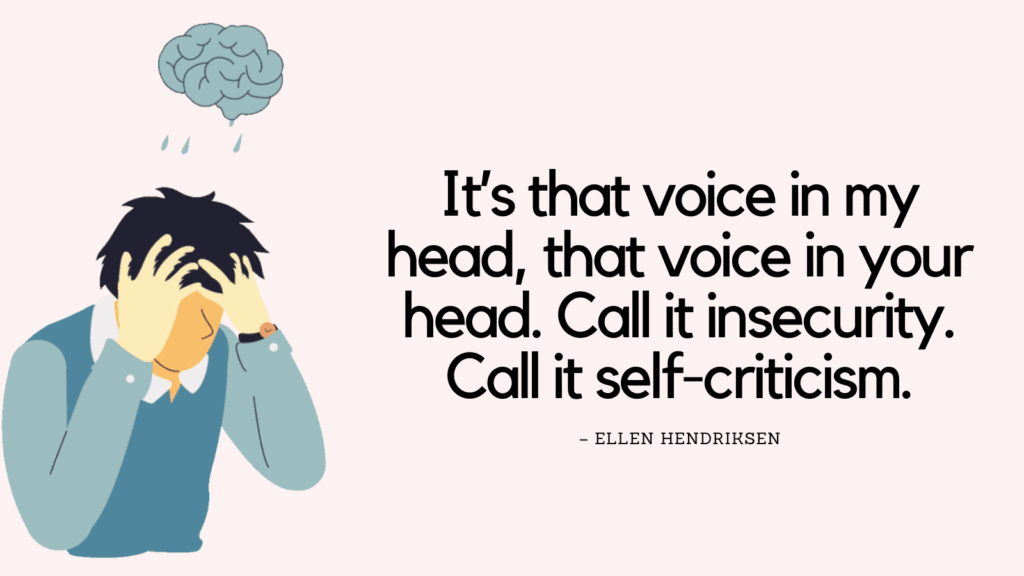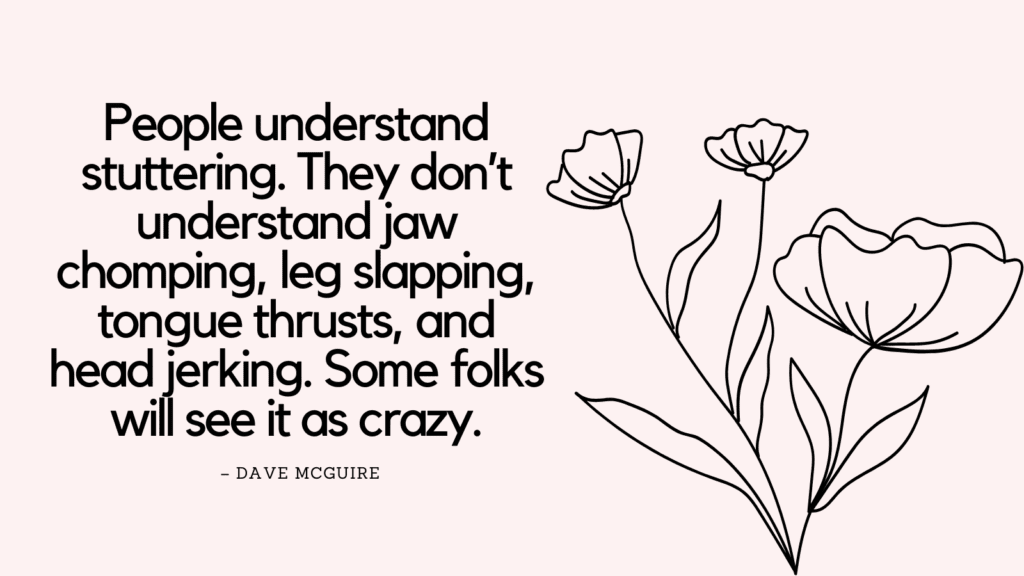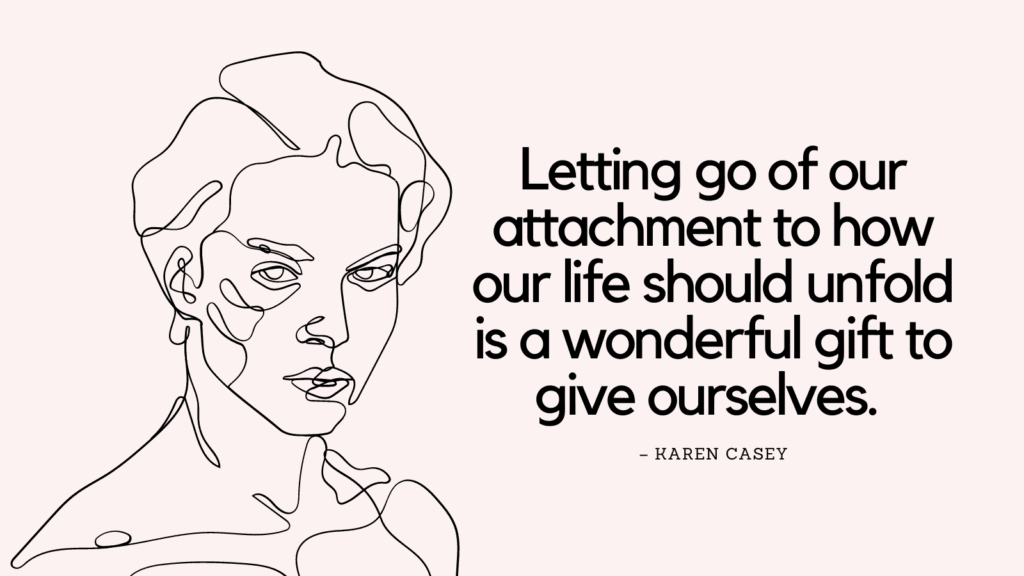This post contains some of the best the voices in my head quotes.
The Voices In My Head Quotes
1. “But the Inner Critic doesn’t just pop up in the moment. It’s present before and after a social moment as well. It’s there in the anticipation and in the aftermath.” – Ellen Hendriksen
2. “In order to challenge the Inner Critic, the plan is to shift how you respond to the Critic’s admonishments—to change how you think when the Inner Critic gets loud and obnoxious.” – Ellen Hendriksen
3. “Ironically, the Inner Critic thinks it is being helpful. In its own harsh way, it is trying to keep us safe.” – Ellen Hendriksen
Related: Top 21 Emotional Writing Prompts To Process Emotions
4. “It is possible to get to know our Inner Critic and connect with it. This strategy is far more effective than fighting with the Critic. It allows us to negotiate with it and get it to relax, so it will stop judging and pushing us so much. However, in order to do this, we must be both separate from the Critic and openly curious about it. In addition, we also must be separate from our Criticized Child, the wounded child part in us who is hurt by the Critic.” – Jay Earley & Bonnie Weiss
5. “It’s that voice in my head, that voice in your head. Call it insecurity. Call it self-criticism.” – Ellen Hendriksen
6. “Lev Vygotsky stated long ago that thought is internalized dialogue, meaning we take in our conversations—our communication with others—and shape our own inner voices based on what we’ve experienced earlier in our lives.” – Daniel J. Siegel
7. “Most people access Inner Critic parts by listening to their attacking words and through images.” – Jay Earley & Bonnie Weiss
Related: Negative Core Beliefs List (& 8 Tips On How To Challenge Them)
8. “Most people have a number of self-judging Inner Critic parts. For example, you might have one Critic that attacks you for how you overeat and how much you weigh, and another Critic that tells you that you’re lazy and should be working harder.” – Jay Earley & Bonnie Weiss
9. “One of the most startling discoveries about our Inner Critics is that they are actually trying to help us. This is an amazing, powerful secret. In its own distorted, confused way, your Inner Critic is actually trying to help you. At first this may seem surprising, but once you get to know your Critic in a deeper way, you’ll come to understand why it is attacking you.” – Jay Earley & Bonnie Weiss
10. “Our Inner Critic is whispering in our head, telling us things will go badly and everyone will see. That we need to do well, but we don’t have what it takes. That we must either find a way to hide or face The Reveal. Whatever your fear, it boils down to one thing: I am not good enough. And furthermore, everyone will see.” – Ellen Hendriksen
11. “Seeing our Inner Critic as an enemy is a natural response to it, and conventional therapy often encourages that perspective. Many therapeutic approaches to the Inner Critic view it as just an attacking bully or an enemy, and they try to have you get rid of it or overcome it. They miss the larger understanding that IFS offers: all our parts are trying to help us.” – Jay Earley & Bonnie Weiss
Related: High Functioning Anxiety Test (& How To Support Anxiety Recovery)
12. “The good news is that because the Inner Critic actually has positive intentions, you don’t have to fight with it or overcome it. You don’t have to win a battle; you don’t have to get rid of it. Instead, you can discover what it thinks it’s doing for you and make a positive connection with it. You can offer it appreciation for its efforts, and it can begin to trust you. Knowing that your Critic’s heart is in the right place makes it possible to create a cooperative relationship with it and transform it into a valuable resource. This relationship makes an enormous difference in your internal landscape and sets the stage for deeper healing.” – Jay Earley & Bonnie Weiss
13. “The Inner Critic is well intentioned but flawed and fallible. But you know what? Its insistence that you are not enough isn’t just shaky; it’s a full-on distortion.” – Ellen Hendriksen
14. “The Inner Critic’s good intentions try to keep us safe but instead leave us floundering, pressured, and insecure.” – Ellen Hendriksen
15. “The underlying internalized negative thought process, which I call “the critical inner voice,” has a very destructive influence on the child’s and later the adult’s approach to life.” – Robert W. Firestone
16. “Think of the Inner Critic as a helicopter parent, swooping in to save us from any upset. It tells us we can’t do it, we might get embarrassed, that it’s too much for us. Just sit this one out so you don’t make a fool of yourself, it instructs. Don’t risk it because people might notice.” – Ellen Hendriksen
Related: What Is the 333 Rule for Anxiety? (& Other Anxiety Coping Strategies)
17. “We ignore these inner voices at our own peril. If we believe their absence from consciousness is proof of their absence from our lives, sadly we may be quite mistaken. In this powerful set of stories, you will see firsthand how a master clinician and psychotherapy innovator helps others, and himself, to integrate the mind by freeing the psyche from the prisons of the past.” – Daniel J. Siegel
18. “When we become aware of how our Inner Critic is tearing us down and ruining our lives, we usually react to it in one of the following ways. We might try to just ignore the Inner Critic’s attacks and think positive thoughts about ourselves. While this is much better than simply believing our Critic, it won’t solve the problem because we’re not really dealing with the Critic. This tactic may work at times, but then our Critic will override our attempts to ignore it and may sneer at our positive thoughts. Or it may sneak up on us with subtle attacks that we don’t even notice.” – Jay Earley & Bonnie Weiss
19. “When you realize that your Inner Critic is actually trying to help and protect you, in its own distorted way, it is much easier to have compassion for it and to connect with it, opening it up for transformation.” – Jay Earley & Bonnie Weiss
20. “Your Inner Critic thinks that pushing and judging you will protect you from hurt and pain. It thinks that if it can get you to be a certain way— perfect, successful, cautious, nice, slim, outgoing, intellectual, macho, and so on—then you won’t be shamed or rejected, and you might even get approval from people who are important to you. It tries to get you to fit in by prescribing rules and then attacking you if you violate them. Even though attacking you actually backfires and causes you more suffering, your Inner Critic is doing what it thinks is best for you.” – Jay Earley & Bonnie Weiss
Related: How To Stop Self-Critical Thoughts Using These Top 10 Techniques
21. “The Inner Critic is sitting in the witness stand like it owns the place. Wow, the defense attorney thinks, the view is different from up here after waiting on the sidelines for so long.” – Ellen Hendriksen
22. “The Inner Critic sends you a strong feeling, and that feeling feels like a fact. Because we feel inadequate, it must be true. Because we feel like a loser, we must be one. Because we feel the heat, we must be turning an Elmo shade of red, and what’s more, everyone must be judging us for it.” – Ellen Hendriksen
23. “Feeling worthless is just the result of an Inner Critic attack and not necessarily the truth about you. Reminding yourself of this truth will go” – Jay Earley & Bonnie Weiss
24. “Your Inner Critic thinks attacking you will help you, so you can ask it some questions to find out its rationale. A good question to start with is, “What are you trying to accomplish by judging (or shaming or pushing) me?”” – Jay Earley & Bonnie Weiss
25. “Your Inner Critic became extreme in childhood because it was dealing with a dangerous or harmful situation—for example, being ridiculed when you tried to get attention or always being told that your work wasn’t good enough. And it believes that the same harm is going to happen now in your current adult life.” – Jay Earley & Bonnie Weiss
Related: What Causes Cognitive Distortions? (+Top 10 Common Cognitive Distortions & How To Challenge Them)

How to Deal With Inner Critic?
The inner critic refers to that negative self-talk or self-judgment that many individuals experience. Dealing with the inner critic can be challenging, but here are some scientifically supported strategies you can try:
1. Awareness
Start by becoming aware of your inner critic’s presence and its negative messages. Notice when it arises and how it affects your thoughts and emotions.
2. Challenge negative beliefs
Question the validity and accuracy of the negative thoughts produced by your inner critic. Look for evidence that supports or disproves these beliefs. Often, you’ll find that they lack solid evidence or are based on distorted thinking patterns.
3. Practice self-compassion
Treat yourself with kindness and understanding. Remind yourself that everyone makes mistakes, and it’s okay to be imperfect. Replace self-criticism with self-compassionate thoughts and affirmations.
4. Cognitive restructuring
Replace negative self-talk with more positive and realistic thoughts. Challenge the inner critic by actively replacing negative statements with more balanced and constructive ones. This takes practice and patience but can lead to a more positive self-perception over time.
5. Seek external perspectives
Talk to a trusted friend, family member, or therapist about your inner critic. Getting an outsider’s perspective can help challenge your negative self-perception and provide a more balanced view of yourself.
6. Mindfulness and meditation
Engage in mindfulness practices to develop greater awareness of your thoughts and emotions without judgment. Meditation can help cultivate a sense of self-acceptance and detachment from negative self-talk.
7. Set realistic expectations
Recognize that perfection is unattainable and that making mistakes is a part of being human. Set realistic goals for yourself and acknowledge your efforts and progress along the way.
Conclusion
Overcoming the inner critic takes time and effort.
Be patient with yourself and celebrate small victories along the way.
If your inner critic becomes overwhelming or persists despite your efforts, consider seeking support from a mental health professional who can guide you through personalized strategies.



